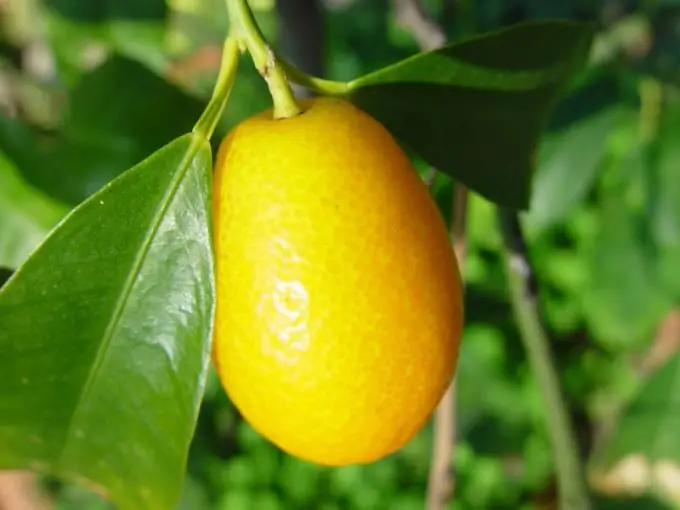- Author Brandon Turner turner@palatabledishes.com.
- Public 2023-12-17 01:37.
- Last modified 2025-01-24 11:11.
Kumquat, fortunella, kinkan, Japanese orange - all these names belong to the same citrus fruit. The homeland of the kumquat is China, from where it spread to other Asian countries, and then to America and Europe. Currently, kumquat, due to its pleasant taste and mass of useful properties, is gaining more and more popularity in Russia.

Japanese orange has an elongated shape and is comparable in size to a walnut. Kinkan fruits are colored orange or orange-yellow, in appearance they resemble small oblong oranges. Fortunella is eaten with a thin skin that has a sweetish taste. The pulp, on the other hand, has a sour-tart taste.
Kumquat application
Kumquat can be eaten both raw and processed. Delicious candied fruits, preserves, jam, marmalade, sweet and sour sauces are obtained from this fruit. Kinkan juice is used for marinating meat and fish, added to cocktails. Fortunella chunks complement fruit salads, cottage cheese and yoghurt well, and serve as an excellent snack for spirits such as whiskey and cognac.
Japanese orange is used not only in cooking. Kinkan is also popular as an ornamental houseplant. The kumquat tree has a miniature crown and bushes well, grows no more than one and a half meters in height. During flowering, the kinkan is covered with fragrant white flowers, and then bears fruit abundantly. Fortunella fruits usually ripen in winter.
Useful properties of kumquat
Kinkan fruits are rich in a variety of useful substances, including vitamins (carotene, ascorbic acid, B vitamins, vitamin E, choline), minerals (calcium, magnesium, potassium, phosphorus, iron, zinc, copper, manganese), dietary fiber, essential oils, pectins, unsaturated fatty acids. The calorie content of kumquat is low - only 71 kilocalories per 100 grams, which makes it possible to classify the Japanese orange as a dietary product.
Regular consumption of kinkan in food increases the general tone of the body, normalizes the functioning of the stomach and intestines, accelerates tissue regeneration, improves metabolism, reduces the risk of arthritis and arthrosis, stabilizes pressure and heart rhythm, prevents the development of diabetes, and has a beneficial effect on the functioning of the nervous system.
In addition, kumquat is able to effectively fight various infections. The Chinese, for example, have long used fortunella to treat fungal diseases. Their correctness was confirmed by modern science, which discovered the substance furacumarin in the pulp of a kinkan, which has antifungal activity. The essential oils in kumquat peel can help ease coughs and help you cope with colds faster.
Japanese orange is also considered to be an effective hangover reliever.






